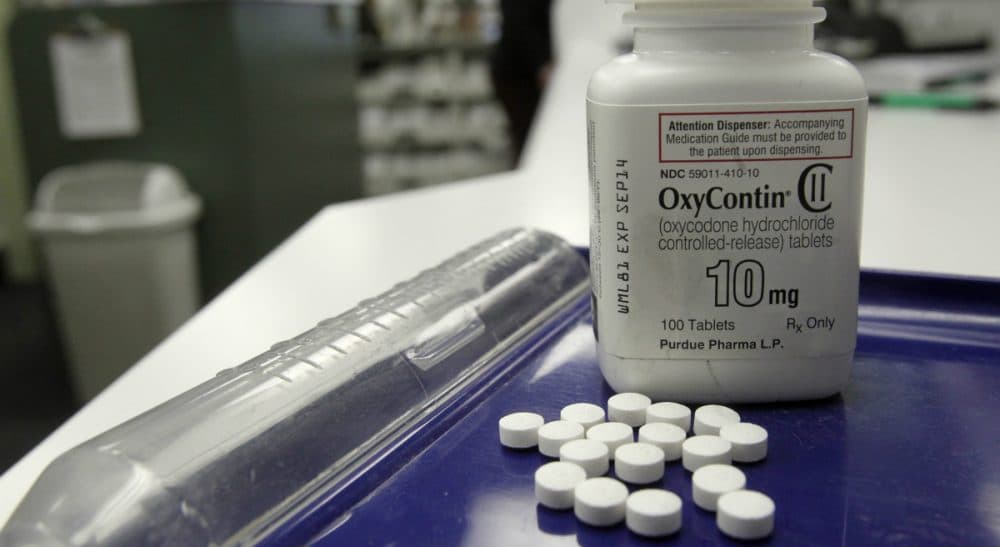Advertisement
Painkillers: Seeing Our Opioid Addiction Crisis For What It Is

Twice lately, people I really like have taken me aside to tell me devastating stories of their family members who are addicted to opioids — oxycodone, hydrocodone and the like. I imagine you have heard many such stories yourself.
It’s so saddening — and maddening: the way someone becomes a stranger — living for the next pill, or, unable to afford them anymore, moves on to heroin. You love your ... wife, daughter, son, father, husband, mother sister, brother, friend ... but you hate what’s happened to them, and you almost can’t remember who they were before they changed into their evil twins. Before they stopped pulling their weight. Before they started doing stuff you didn’t know they had in them — robbing their grandmother’s jewelry box, terrorizing intimates with crazy rage or just freezing out everyone around them. It’s as if they’re trapped in a horror movie where the zombies win; a plotline with a very bad end. As the story unfolds, they lose their jobs; they crash cars and land in intensive care; they go to court and then to jail. Too often they overdose and die, leaving all around them shattered, without words for what they’ve witnessed or the grief they feel.
Eleven billion in [opioid] revenue, and yet we lack adequate money to treat the people they harmed. How is that?
According to a 2014 report, “The U.S. consumes more than 80 percent of the global supply of opioids, and overdoses from prescription opioid drugs kill nearly 17,000 Americans every year, which is one overdose death every 30 minutes.”
For a long time, we have turned our back on our drug problem. We have seen it as “them” — as messed-up people making bad choices; as “ weakness,” as something that somehow must be someone’s own fault. And perhaps it sometimes is. But mostly, we have resisted seeing our pain pill crisis for what it is: a predictable consequence of capitalism-as-extreme-sport that too often puts profit over people. Instead of insisting corporations behave responsibly, we have unintentionally sacrificed our own kin for their profit.
You think I overstate?
Then read what Dr. Art Van Zee wrote in the American Journal of Public Health in 2009 about the wily ways of the company that created OxyContin. (OxContin is a slow release form of oxycodone.)
“When Purdue Pharma introduced OxyContin in 1996, it was aggressively marketed and highly promoted. Sales grew from $48 million in 1996 to almost $1.1 billion in 2000. The high availability of OxyContin correlated with increased abuse, diversion, and addiction, and by 2004 OxyContin had become a leading drug of abuse in the United States.”
Describing Purdue’s approach, Van Zee notes, “In 2001 alone, the company spent $200 million in an array of approaches to market and promote OxyContin.” He goes on to describe how fiercely the company worked to identify and “influence doctors’ prescribing habits.”
Why? So the doctors would write more prescriptions, and Purdue would make more money. Help me out here. Why is it that when a poor kid on a street corner sells a dose of heroin to an undercover cop, he’s sent to jail, but when a drug rep for Big Pharma pressures doctors to prescribe opioids to people who don’t need them, and shouldn’t ever get them, he gets a promotion and a bonus?
Writing in Fortune Magazine in 2011, Katherin Eban noted that in the previous year 254 million prescriptions for opioids were filled in the U.S. Enough, she added, to “medicate every American adult around the clock for a month.” Eban’s report also mentions that the Centers for Disease Control “estimated that nonmedical use of prescription painkillers costs health insurers up to $72.5 billion annually in direct health care costs.” And that “Opioids generated $11 billion in revenues for pharmaceutical companies...”
Eleven billion in revenue, and yet we lack adequate money to treat the people they harmed. How is that? Of course, there are legitimate uses of painkillers. Of course, pharmaceutical companies have brought us some great, life-saving wonder drugs. But that’s not a reason to let their excesses go unaddressed.
And not everyone is. Since 2007 — for eight long years so far — the state of Kentucky has been suing Purdue, attempting to force them to pay for some of the devastation they have wrought. The decision might come this year.
Let’s decide that capitalism is in balance when it lets us take care of our own.
I certainly hope the suit succeeds, but it is time for a much bigger sea change: Now that everyone knows someone who is addicted to these medications, now that everyone knows that addicted people are not “them” — that in fact they are us — let’s at long last stop treating drug abuse problems by marginalizing, stigmatizing and punishing people.
Let’s insist instead on ending antisocial behaviors by drug corporations. Yes, of course, let them keep money they earn responsibly, but let’s push them to adhere to a notion of the common good that isn’t just “we’ve got ours.” Let’s raise our voices and insist that pain pill manufacturers use all their opioid profit to set up lots and lots and lots of free treatment programs to heal all those harmed by their pills. Let’s decide that capitalism is in balance when it lets us take care of our own.
